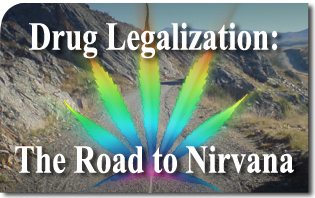 Critics of present drug policy claim prevention programs are not working. Efforts aimed at convincing teenagers not to become addicted have not stopped drug usage. At the same time law enforcement officers, taking a supply-side approach to the problem, have not prevented drugs from reaching thriving markets.
Critics of present drug policy claim prevention programs are not working. Efforts aimed at convincing teenagers not to become addicted have not stopped drug usage. At the same time law enforcement officers, taking a supply-side approach to the problem, have not prevented drugs from reaching thriving markets.
Many claim the solution lies in legalizing drugs especially marijuana. Then, billions of dollars and countless law enforcement hours would be saved and thousands of drug dealers and users would be freed from prisons. The newly legalized product could be taxed and regulated and all would benefit in the end.
Filial Petition to Pope Francis to Save the Family — Sign Here
When looking for solutions, few ask the important question: Why do millions of Americans take drugs in the first place? It is a mystifying question since there are very few real benefits attached to the practice. Besides being illegal, abusing drugs easily becomes an enslaving addiction. It is an expensive obsession that can lead to crime. Drug abuse, even marijuana usage, can also cause all sorts of mental disorders such as depression, paranoia and psychosis. Addiction can have disastrous effects upon relationships with family and friends.

“Sadhu” by Jakub Michankow is licensed under CC BY 2.0
There is obviously something wrong here. Most Americans know the harmful effects of drugs and yet are still drawn to them. The reason why they persist in this abuse is that drugs correspond to an extremely strong appetite that compels so many, especially young people, to jeopardize their lives and careers for the thrill of getting high.
What is this extremely strong appetite? It is the natural craving for spiritual things. All people have material or physical appetites like eating and drinking that correspond to keeping the body healthy. Much more important however are the spiritual appetites that deal with the search for meaning. Normally these can be filled when people look for what are called the “transcendentals” or the good, the true and the beautiful. Spiritual appetites can also be satisfied by seeking after sublime and sacred things like works of art, ideas, virtuous acts and heroic feats that by their excellence and grandeur provoke great emotions and fulfillment. All these things can eventually lead to union with God, the highest spiritual good.
Spiritual desires cannot be suppressed since they are part of human nature. And when people do not find the object of these sublime longings, it leads to frustration and depression. The natural tendency is to look for intense pseudo-spiritual equivalents. Hence comes modern culture’s obsession for the self-destructive experience of drugs, sexual promiscuity, and bizarre fantasies that characterize today’s spiritual wasteland.

To find a solution for drug abuse, one must address the present materialistic and hedonistic culture that stifles the search for meaning. One must disengage from what might be called the frenetic intemperance of the times where all must be pleasurable, instant and shallow. Drugs must be rejected as false outlets for satisfying spiritual hunger.
In her recent book, The Spiritual Child, Columbia University professor Lisa Miller makes a direct connection between spirituality and false outlets. When people do not find the spiritual in their lives, she acknowledges they will try to fill the void. She contends that teenagers experience a period of questioning that makes them especially vulnerable to depression and then drug use. When they have a strong spiritual connection to the “transcendental realm” however, she finds they are 70 percent to 80 percent less likely to be involved in heavy substance abuse. Highly spiritual young adults are likewise protected as are adolescents who are surrounded by those with strong “spiritual instincts.”
In the final analysis, drug abuse is a spiritual problem not a health or psychological one. Drugs are the vehicle by which frustrated Americans escape into fantasy, dreams and ecstasies. Flooding the market with legalized drugs will only accelerate this flight from reality and ruin so many more lives and families.
Much better is to reconnect with spiritual and sublime things that will fill the void found in today’s materialistic and stressful culture and point in the direction of God. Until the cause of drug abuse is addressed, efforts to deal with the problem will be a meaningless road to Nirvana.
